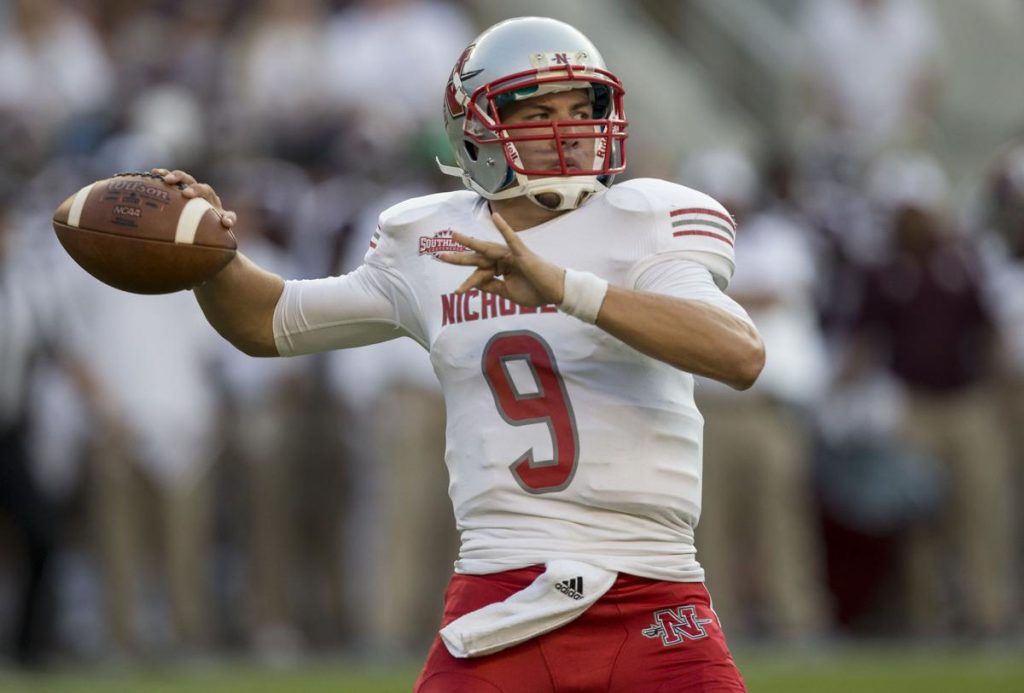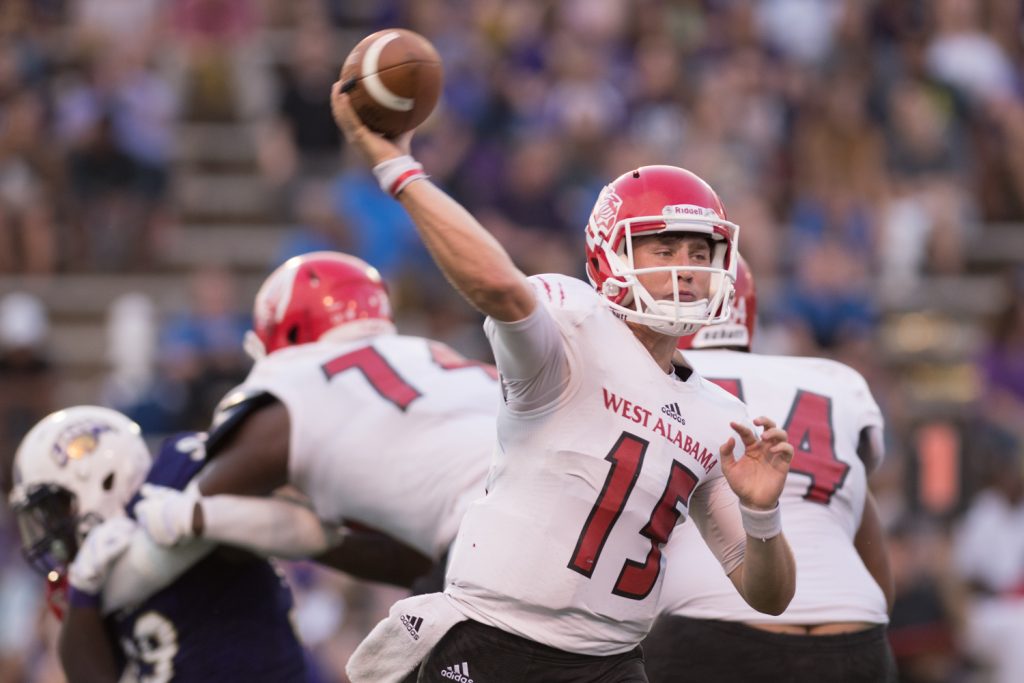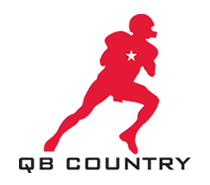
A different level: Trio of QBC trainees find big success at small schools
By Doug Young, Athlete’s Ink
Chase Fourcade’s first college start was pretty much the stuff of quarterback dreams. An SEC home game. More than 92,000 screaming fans. And a clutch comeback that included two TD passes to put his team up late in the second half.
But the fans in Georgia’s Sanford Stadium weren’t cheering for Fourcade. In fact, many of them probably had never heard of his school. The Nicholls State Colonels fell 26-24 to the Bulldogs that day, but the game affirmed what Fourcade believed when he chose Nicholls over Maryland (and a host of other FBS schools): he didn’t have to go Power 5 to play college football at the highest level. And no matter the level of play, the experience would be better if he was actually playing.
Fourcade, a Louisiana native who trains with QB Country’s Alex Williams in New Orleans, is one of a number of big-talent quarterbacks throwing darts at smaller schools where the action is just as intense and the passion for football rivals most high-profile programs. There may not be as many blue-chip athletes playing FCS, Division II & III and NAIA football, but what’s lacking in measurables is more than made up for with skills and desire.
“Big D1 schools look at height and weight and think it’s everything,” says Fourcade, whose 6’0 stature likely dissuaded earlier offers from bigger programs. “We don’t really care about that. [At Nicholls] it comes down to having that heart and wanting to go out and win regardless of how tall or small you are.”
To be sure, Fourcade knows a lot about major college football. His father, Keith, and uncle, John, both played at Ole Miss and later for the New Orleans Saints. But finding the right fit during the recruiting process was more important than picking a brand name.
Making an Impact
“I’d say the biggest thing is to go where your heart really wants you to go and where you can make a huge impact,” says Fourcade. “Playing early is great, that’s something you don’t get everywhere.”

Chase Fourcade has helped put Nicholls State on the map. (Photo by Sam Craft, The Advocate)
Fourcade has been a starter since he arrived at Nicholls — a school of 5,200 students about an hour southwest of New Orleans — and he’s on pace to shatter nearly all of the program’s passing records. Along the way, he’s garnered multiple conference and FCS honors. More importantly, he’s been part of building a winning tradition — an opportunity that appealed greatly as he considered his college options.
“The crazy part is that everything [Nicholls Head] Coach [Tim] Rebowe told me we were going to do is what we’re doing now,” says Fourcade. “We have a bunch of guys who came here with me who wanted to put their stamp on Nicholls. He told us to have trust in each other, love each other and the sky’s the limit. He knew we were going to get it done.”
A Nicholls program that went winless two years before Fourcade arrived is poised to have its third winning campaign in a row. The Colonels have knocked off Power 5 schools like Kansas (2018) and put scares into Texas A & M (2017) and Georgia (2016). Last season, they earned a national ranking and had their first-ever home playoff game. They’re back in the national rankings again this year and hoping to make a playoff run. The stands at John L. Guidry Stadium in Thibodaux are rocking.
Williams, who has trained Fourcade since his first year of college and starred at NAIA Belhaven University, knows that there are many paths to playing college football. Success is often about owning the experience, whatever the level or program may be. No one, says Williams, does that better than Fourcade.
“My whole thing and really his whole approach is to own where you’re at and become a legend there,” says Williams. “For Chase, that meant go to a program that hasn’t been very good, be part of creating a culture of success and quality play. He’s never wavered from that. He’s like, ‘these guys loved me from the beginning and I’m going to go give them my all.’ It’s pure loyalty to a program that bought into him from day one. That’s really cool in today’s climate.”
And there are other unique perks to being a big fish in a small pond.
“We go to Manning Passing Academy [held annually at Nicholls State] and everyone around town knows who he is,” says Williams. “Hell, he’s got a painted picture of himself at the most popular bar in town. How many juniors in college can say that?”
A Chance to Play
Smaller schools can also prove fertile ground for late bloomers who’ve flown under the radar during their high school careers — or just haven’t had much of a chance to play.
West Alabama’s Harry Satterwhite was a backup at McGill-Toolen High School (AL) until his senior year, limiting his opportunities for exposure and experience. Although he made the most of his senior campaign, earning All-State honors and setting single-season school records for passing and touchdowns, it was still tough to find scholarships late in the game.
“It wasn’t like Alabama or Auburn were calling, but I was looking for an opportunity to play,” says Satterwhite. “I love competing and playing quarterback, I always have. This is what I wanted to do.”
With the help of QB Country founder David Morris, Satterwhite landed at the University of West Alabama, a school of 1,900 students in rural Livingston with a strong Division II football tradition. There were no guarantees he’d ever start, but Satterwhite had been patient before and knew that if an opportunity came, he’d make the most of it.
After a redshirt freshman year, Satterwhite played sparingly over the next two seasons before cementing a starting role as a junior. Last year, he exploded onto the scene — passing for 3,400 yards and 26 touchdowns and leading the Tigers to their first Gulf South Conference championship in five years and the quarterfinals of the NCAA Division II playoffs. Satterwhite earned the Alabama Sports Writers Association’s Small College Athlete of the Year Award, all-conference first team honors and was one of ten finalists for the Harlon Hill Trophy — Division II’s highest football honor. This year, Satterwhite is again near the top of the Division II passing leaders and leading West Alabama to another successful season.
Says Morris, Satterwhite is the perfect example of an athlete who just needed a chance — a chance that might not have come at a different level.

Harry Satterwhite is one of the nation’s top DII QBs. (Photo courtesy U. of West Alabama)
“Harry’s a guy who you might overlook when you see him,” says Morris. “He’s not physically imposing, you’re not thinking ‘that’s the guy that’s going to shatter all the records here.’ But he’s got that confidence and maturity that you can see when he’s playing; his best moments are when it really matters.”
Morris points out that most impressive part of Satterwhite’s story is his patience and perseverance. Staying the course and waiting for a chance to play requires a great deal of faith in an opportunity that may never come. Morris knows that well; he spent most of his college career as a backup at Ole Miss.
“These days, whether it’s high school or college, everybody transfers looking for that perfect environment, the perfect offense, the next best thing,” says Morris. “Harry waited behind a stud in high school when a lot of people as good as Harry would have left. At West Alabama, he just kind of stayed and battled and didn’t pout or leave. He didn’t make it about himself. He stayed and waited for his opportunity. I think there’s something to that. He was raised the right way and had great maturity to know that ‘my time is coming; it may not be exactly how I would’ve written the story, but it’s coming.’”
Getting to the Next Level
While it’s harder to make the jump from non-FBS schools to the pros, playing at a smaller school doesn’t always mean sacrificing lofty, long-term goals. As counterintuitive as it may seem, the small school route may actually be a more realistic path for some quarterbacks who dream of taking snaps in the NFL.
Samford senior quarterback Devlin Hodges is the nation’s leading passer at any level (more than 3000 yards and 26 TDs through October 28) and is on pace to become the all-time FCS passing leader. His prolific career has earned the attention of pro scouts and many believe he could follow in the footsteps of recent FCS quarterbacks like Kyle Lauletta (Giants/Richmond), Carson Wentz (Eagles/North Dakota State) and Jimmy Garappolo (49ers/Eastern Illinois) in landing on the NFL draft board.
Hodges chose Samford — a school of just over 3,000 students in suburban Birmingham, Alabama — for a host of reasons, but positioning himself for the NFL was not a strong consideration. Over time, the opportunity to play early and develop in Head Coach Chris Hatcher’s high-octane, pass-oriented “Hatch Attack” offense (a derivative of the “Air Raid’) enabled Hodges to exceed even his own expectations.
“Playing in the NFL has always been a dream, it’s always something I wanted to do,” says Hodges. “But before this season, I never knew that I really had a chance. I always thought I had a chance, but to hear other people say it, to say that you might have that opportunity is awesome. I never knew going into Samford how successful I would be or that all these records would get broken. I’ve been really blessed with this situation and am really glad I came here.”
QBC Birmingham’s Ben Neill, who trains Hodges and served as his mentor for an internship last summer, says Hodges chose wisely.
“Pride gets in the way sometimes,” says Neill. “You have guys say ‘I’ve got to go D1, got to go big-time.’ Quarterbacks like Devlin that understand it’s not about name recognition, it’s about playing football are usually the ones who end up succeeding.”
Like Fourcade, Hodges has had some near-misses against big-name schools. He threw for a career-record 475 yards in a 36-26 loss to Florida State earlier this season — a game that wasn’t decided until the closing minutes. Two years ago, he notched 468 yards in a 56-41 defeat at Mississippi State.
“Playing in that type of atmosphere, in front of that many fans, we want to take it to another level,” says Hodges. “It’s been awesome to be in those games and have a legitimate shot at winning. In my eyes, we should have won both of those games.”
As evidence of just how competitive college football is — and how good quarterbacks are — at all levels, Hodges and Satterwhite squared off in a DII vs. FCS shootout last year, throwing for more than 300 yards apiece in a hard-fought 48-41 Samford victory.

Devlin Hodges is the nation’s leading passer at any level. (Photo courtesy Samford Athletics)
“QB is such a competitive position,” says Neill. “You have 130 FBS schools that give out an average of one quarterback scholarship a year. You have two to four scholarship QBs on a staff per year competing for one job. Winning that job is hard enough, then you have to go out and try to win on the field. If you can do all that and be successful, if you can win at any level – FBS, FCS whatever, you’re giving yourself a chance to play at the next level.”
Hodges has done that, leading Samford to consecutive FCS playoff berths (2016, 2017) for the first time since 1992. The Bulldogs have been nationally-ranked in each of the past two years and in the hunt for the SoCon championship throughout Hodges’ career. They have that chance again this year, with Hodges leading the way.
Neill points out that if you’re good enough to play at the next level, you’re going to know it. Extensive scouting, access to video and information and on-field opportunities have made it easier for small college players to be noticed.
“Guys know where they stand. At MPA, for example, you’re a small school guy on the same field as your big school peers, you have a chance to go out and compete against them. You get to a point where you can say, “I can hang with these guys who I know are gonna get drafted’ so you begin to know.”
Still Takes Work
Reflecting on his own small school experience, Williams notes that playing and succeeding takes no less effort and preparation at a small school than doing the same at a bigger program. Sometimes, it’s even harder given fewer resources. One upshot of playing in a smaller environment, however, is that quarterbacks may have a bit more time to develop, for their efforts to bear fruit. Where FBS schools may more likely to drop a quarterback after a poor performance or the arrival of a new recruit, small schools generally take a longer view.
Neill says Hodges’ growth has been impressive, especially coming from a high school program that emphasized the running game on offense.
“He’s had to develop as a passer — his arm strength and accuracy has improved and also his reads and understanding the Air Raid. One of first things I noticed when I started training him, is he’s an extremely hard worker and has the perfect QB personality. He loves the game. He has the right amount of seriousness and leadership abilities that people want to follow him and play hard for him, but he doesn’t take himself too seriously. It’s easy for him to get over mistakes and take risks on the field. That’s who he is and it’s also been helped by the environment he’s in.”
Says Williams, “Chase has an absolute whip, a cannon – but he’s worked hard at it. He’s a perfectionist, but he does it with a pure love for the game. He’s one of the better guys I’ve ever trained from a feedback perspective; he’s really good about taking in-the-moment coaching and putting it into the next rep. He’s always trying to find ways to get better.”
Morris says he’s had fewer players who’ve worked harder than Satterwhite.
“Harry’s a kid I’ve coached for a long time and for him to experience success and experience it consistently is not surprising to me,” Morris explains. “I use Harry as a motivational story because I’m so proud of him. It’s a story about staying the course and not jumping ship.”
Love of the Game
Fourcade, Satterwhite and Hodges all acknowledge that one of the advantages of choosing the schools they did is having the opportunity to stay in-state and be closer to home, playing in front of friends and family.
Fourcade, who is less than an hour away from his hometown of Metairie, has never played a game without his older brother, Taylor, in the stands. Longer travel would make that more difficult for Taylor, who has cerebral palsy and uses a wheelchair. Hodges’s hometown of Morris is less than 30 minutes from Samford’s campus. Satterwhite has the longest commute at just over two-and-a-half hours from Mobile to Livingston, but it’s an easy ride that his parents make every weekend during football season.
Another advantage of the small school experience is the close-knit, community feeling that a more intimate campus provides. The town-gown relationship is stronger. Student-athletes feel a greater connection to their coaches, professors and non-athlete peers.
“It’s a cool thing, it’s different,” says Satterwhite. “Everyone in town comes to the games, students as well. Everywhere you go, people know you’re a football player and know who you are, even if you’ve never seen them before. The environment is always good and people are really nice.”
Hodges appreciates being part of a common community, tied together by more than sports.
“A lot of people that go to Samford refer to the ‘Samford Bubble.’ I think it’s a true thing,” says Hodges. “Being a small school, people support each other whether they play a sport or not. It’s awesome to have friends outside of football, people I can hang out with and not have to talk about football with.”
Not all experiences are the same, however, and the vast majority of small college programs operate out of the spotlight, with few bells and whistles. At times the crowds are smaller than what most players experienced in high school. Most players aren’t thinking about the NFL; they’re getting an education and simply getting a last chance to play a sport they love. While that may also be true at FBS programs, there are fewer incentives (full scholarships, national television, big stadiums, tricked-out locker rooms, airplane travel, etc.) to motivate an athlete over his career.
Playing football is about playing for the love of the game.
“It’s a lot of guys who love to compete, who love this game and that’s why they’re here,” says Satterwhite. “Football is football. I love it and I’d take the chance to play it anywhere. It’s all about how bad you want to play.”


